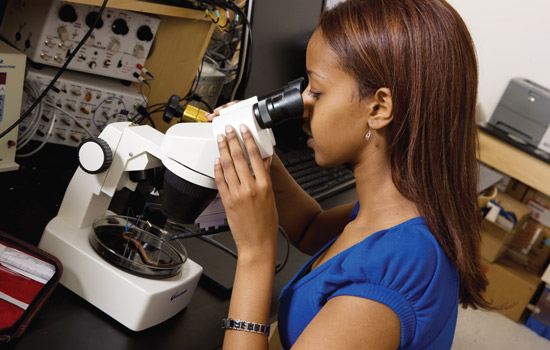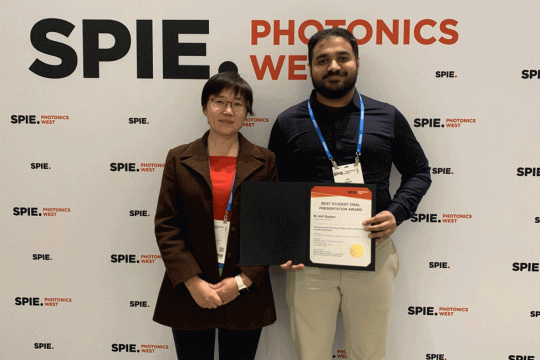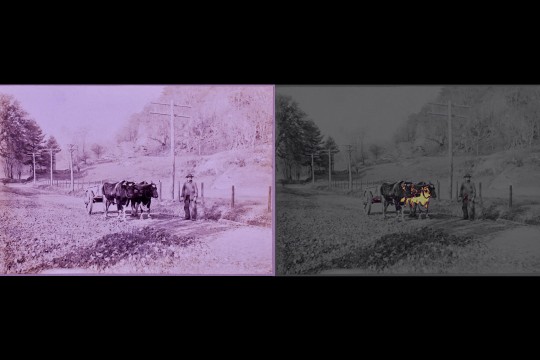Virtual College Fair for Female Applicants Interested in High-Tech Fields
RIT encourages women to enter science, technology, math and engineering disciplines
John Myers
Adey Gebregiorgis is pursuing a BS/MS in electrical engineering. It's one of the many undergraduate degrees in the science, technology, engineering and math (STEM) disciplines that RIT offers.
Rochester Institute of Technology continues to look for innovative ways to reach young girls and women about the career opportunities available in the science, technology, engineering and math (commonly referred to as “STEM”) disciplines.
With decisions looming for high school seniors about where to attend college this fall, RIT is hosting a “virtual college fair” from 4 to 9 p.m. on Thursday, Feb. 26, specifically for its female applicants and other female high school students from across the country interested in the STEM majors.
Female faculty and students from RIT’s College of Science, College of Applied Science and Technology, Kate Gleason College of Engineering and B. Thomas Golisano College of Computing and Information Sciences, along with representatives from RIT’s Admissions Office and Financial Aid Office will be in the chat rooms to answer questions.
“For some female students this will be their first connection to RIT as they just took the PSATs, while for others, they’ve applied to RIT and may have previously attended one of our open houses,” says Marian Nicoletti, RIT’s senior associate director of undergraduate admissions. “The virtual chat is a great opportunity for high school students to talk directly to a current female RIT student about a specific STEM program. We’ll have chat rooms set-up for each of the different colleges.”
Catina Jelfo, a first-year mechanical engineering major at RIT, is among those who will “chat” with high school students.
“I benefited myself from talking to RIT students about the different programs available and their experiences when I was in high school,” says Jelfo, of Rochester. “It helped me so much. I’m more than willing to help others.”
RIT students and faculty will also be able to answer questions about social activities, mentoring opportunities and community programming.
The university offers more than two dozen undergraduate programs in the STEM disciplines including packaging science, environmental management, civil engineering technology, chemical engineering, computer engineering, physics, chemistry, mathematics, information security and forensics, and game design and development.
In a survey conducted by the U.S. Department of Education, nearly 852,000 bachelor’s degrees were awarded to women in the United States in 2006, but only 11 percent of those degrees were in the science, technology, engineering and math disciplines. In contrast, men earned 23 percent of B.S. degrees in those programs.
Bachelor’s Degrees Awarded to Women in 2006 Academic Year
All Fields - 851,824
Non-science and engineering fields - 612,551
Social Sciences - 79,350
Psychology - 68,351
Biological and Agricultural sciences 53,939
Mathematics and Computer Sciences - 15,730
Engineering - 13,300
Physical Sciences - 6,957
Earth, Atmospheric & Ocean Sciences - 1,646
Source: National Center for Education Statistics, U.S. Department of Education
RIT’s Division of Enrollment and Career Services says one big obstacle for reaching girls is the lack of role models working in non-traditional occupations.
“If young women do currently have role models, it’s their chemistry teacher or their math teacher that may be a woman,” says Nicoletti. “That’s great that they are in the teaching professions, but these are traditional female occupations. These girls are not thinking that if they enjoy math then perhaps they’ll be a mathematician or be an actuary, or if they like science they may want to pursue a career in biotechnology or nuclear medicine. RIT is reaching out to them to open their minds to the entire occupational spectrum that exists.”













